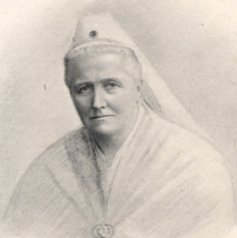MRS LOUISA MARTINDALE 1839 - 1914

Mrs Louisa Martindale was a liberal and nonconformist; she married a widower with a young family, Mr. Martindale, in 1871 but was widowed in 1874 with two young daughters of her own another Louisa and Hilda.
All her life she was involved with in public works and when living in Lewes with her young family was active in The Women’s Liberal Association, The Women’s Cooperative Movement, and the British and Foreign Bible Society. In 1886 Mrs Martindale moved with her daughters from Lewes to Brighton, living at 2 Lancaster Road, Preston, and her vigorous involvement in public life became concentrated on bettering the lives of women - politically, at work and in education - and often practically. She opened her home to poor local women, local shop assistants, foreign governesses, domestic workers and frequently gave financial help as well as making presents of cooking utensils to young women about to be married !
She became President of the Brighton Women’s Liberal Association and was strong believer in Home Rule for Ireland; she believed fervently in women’s rights to an education and, of course, to be enfranchised ! In 1894 the Parish Council’s Bill had enabled propertied women to vote for and sit on parish Councils, District Councils and Vestries, but this victory was overshadowed by the Liberal Government’s obdurate refusal to extend the franchise to women further. Mrs Martindale then became active in the women’s Suffrage Movement, and formed “The Practical Suffragists” an organisation which separated itself from the Liberal Party and later merged with the National Union of Women’s Suffrage Societies. In later life she lectured to the Women’s Emancipation League on the circumstances of Indian women.
In 1903 after a long and active public life Mrs Martindale retired to Cheelys, her house in Horsted Keynes in Sussex where she became part of the village community as well as continuing her work with the NUWSS , the National Council of Women and the London Missionary Society. She was friendly with the Lawrence Sisters and helped them when they set up their school - later to become Roedean - with 5 pupils at 25 - 26 Lewes Square, and was the first Chairman of the council for the Lewes Road Dispensary for Women and Children in 1899.
She died 1913 and is buried in St. Giles’ churchyard at Horsted Keynes. A development of modern houses has been built on the site of her cottage “Cheelys” and the “Martindale Centre” which she founded is still in active use in the village today.